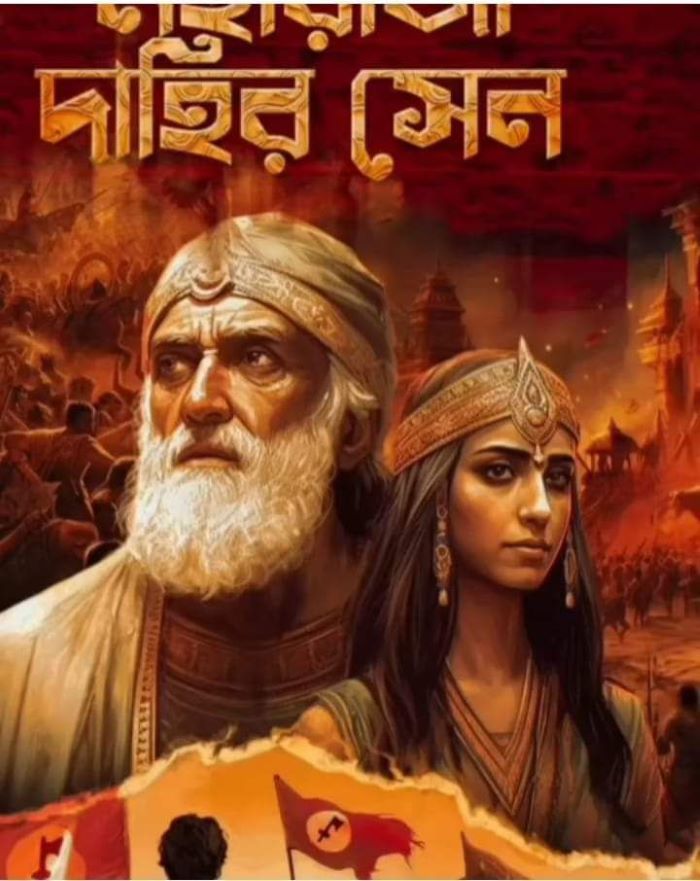
The English translation of a novel ‘Maharaja Dahir’ authored by Kolkata-based renowned novelist Debasree Chakraborti in Bengali language. The novel has been translated by Rajesh Giri
On that day, Maharaja dressed in white clothes and just came to the front of the window of his room; he had heard from his father Chach that absorbing the rays of the setting sun into the body paves the way to spiritual life. While Maharaja is staring fascinated at the golden beauty of nature in front of him, the ochre glow of the parting sun is spreading all over the canvas, which is carrying a message of deep sacrifice on the mind of Maharaja.
Maharaja felt that the moment of leaving the worldly ties had arrived, as if God was conveying that message to him at this very moment. Maharaja looks like a saint at this moment; his white silk robes draped in a mystic veil. Just then, his Prime Minister Budhimaan arrived. Sensing his presence, Maharaja looked back, smiled and said, “Budhimaan! Let me stay out of this world for a while, I would listen to you back from the temple.”
There is always a discomfort in the eyes and face of Budhimaan, when something very concerning happens. Budhimaan’s face becomes like this. He looked at Maharaja without leaving and said, “Maharaj, it is not possible to go to temple today.”
Maharaja was a little surprised to hear Budhimaan, as his name rightly represents his wisdom. He took on many responsibilities by himself to give Maharaja some relief. So his expression of this kind surprised Maharaja.
Maharaja said, “Budhimaan, you seem very worried!”
 Darkness is gradually veiling the sky of Aror, lamps are burning all around the palace, but now no one is allowed to enter the Maharaja’s room. Before entering this room, the Prime Minister had forbidden that no one should enter here at this moment. There is a dense obscurity between the Maharaja and him. The Prime Minister’s face cannot be seen clearly. He said, “Your Majesty! Hajjaj, the chief commander of the Arabs has sent envoys.”
Darkness is gradually veiling the sky of Aror, lamps are burning all around the palace, but now no one is allowed to enter the Maharaja’s room. Before entering this room, the Prime Minister had forbidden that no one should enter here at this moment. There is a dense obscurity between the Maharaja and him. The Prime Minister’s face cannot be seen clearly. He said, “Your Majesty! Hajjaj, the chief commander of the Arabs has sent envoys.”
Maharaja asked, “But why?”
Budhimaan said, “Few days ago a ship was sailing to Arab from Sinhala. There are some Arab merchants there who were sending valuable jewelries, ornamental stones and women to the Caliph as gifts. The pirates captured the ship near Sindh coast, rescued all the women and sent them safely back to Sinhala with all dignity. This incident caused insult to the Caliph and crucified his honor, so he sent his messenger with the demand of all the looted wealth along with the women who were captivated.”
Maharaja Dahir’s pulse started to accelerate. Sometimes he feels like Bhishma, the son of Ganga. Although he has a desire for liberation inside, he is no longer free from the vicious cycle of this worldly ties. The Prime Minister’s words appear to him like mundane material of Maya (illusion), which is very temporary, however, after a time it dissipates like a bubble. Thinking about this, he sighed and said, “Where is he?
Budhimaan said, “He is waiting outside. If you allow, I will bring him in.”
Maharaja Dahir said, “Tell to light the lamp in the room before he comes, I am having difficulties in the dark.”
Maharaja saw that the picture outside had become poetically dignified orange, inviting him to delve into a spiritual life, on the other hand, the darkness of this room, which symbolized the darkness of mundane life, which he could not get out of disowning it. In this darkness he saw a solitary point source of light.
Budhimaan himself brought a lamp and placed it in this room, but did not allow any servant to enter. Then an Arab man and another translator entered the room. The Arab envoy began to read the message of the Arab general Hajjaj written on a cloth and the translator continued to translate it into Sindhi.
“Sindh soldiers never attack anyone unnecessarily, unless they are attacked. Passenger ship was attacked by the pirates near Debal port.
The summary of the statement of the Arab commander Hajjaj is that the soldiers of Maharaja Dahir Sen imprisoned the merchants coming from the country of Sinhala at Debal port and all their goods in the ship were looted by the soldiers of Maharaja Dahir. Hajjaj demanded that all merchants be released with dignity and all looted property be returned.
The message gets reflected around the room creating a horrific vibration. At this stage of life, he no longer likes these surrounding pressures. Maharaj Dahir became very indifferent to the current situation in his last stage of life. So he considered this message of Hajjaj to be of no importance and he felt that he was stopped for a very simple reason before going to the temple of Devi MAA. He said with great annoyance that “Sindh soldiers never attack anyone unnecessarily, unless they are attacked. Passenger ship was attacked by the pirates near Debal port. Though I have no association with them still I think whatever they did is nothing wrong. In recent past those Arab bandits many times captured women of Sindh dragged them on the streets with chains on their neck and waist. Devastated their honor and ultimately sold them in the market. So if they rescued those poor mothers of being a sex slave then I have nothing to say about this. It is our holy duty to protect the dignity of motherland as well as of each and every mother and daughter of Sindh and other.”
Now he looked at the Prime Minister and said, “Budhimaan, don’t act as an obstacle like this in my sadhana to Devi MAA; try to learn to do some things by yourself from now on.”
Saying this, Maharaja left. There was still some glow outside, and Maharaja in this twilight set off on his horse towards the cave-temple. There is a peculiar joy in riding a horse to Maa’s temple in such an environment. This path is like a spiritual sojourn. In the back is the throne and in front is Maa Kali. The crimson glow of the sun setting in the western sky falls on the plains ahead. The synthesis of red and black looks like there is shed of heavy blood.
Maharaj saw some shadow dancers in that wilderness, who come down from the past to the present human conscience and give him a special message of life. Maharaja dismounted from his horse and proceeded in that direction.
He could see hundreds of dismembered bodies lying in the desert, and a group of men and women being dragged somewhere with ropes around their waists. Those shadow people are looking at Maharaja and shouting, ”Maharaj, we beg for justice.” Let them suffer their karma. Maharaj looked and looked at that for some time. Then he again headed towards the temple. (Continues)
Click here for Part-I , Part-II, Part-III , Part-IV , Part-V , Part-VI , Part-VII, Part-VIII
________________
 Debasree Chakraborti is a renowned novel writer of Bengali language. Based in Kolkata, West Bengal, India, she has done Master’s in Modern History from the Kolkata University, and authored some thirty books, mostly the novels, with historical perspective and themes. Her most recent novel is ‘Maharaja Dahir’ that covers the history of Sindh from 662, the year of first attack on Sindh by the Arab armies till date.
Debasree Chakraborti is a renowned novel writer of Bengali language. Based in Kolkata, West Bengal, India, she has done Master’s in Modern History from the Kolkata University, and authored some thirty books, mostly the novels, with historical perspective and themes. Her most recent novel is ‘Maharaja Dahir’ that covers the history of Sindh from 662, the year of first attack on Sindh by the Arab armies till date.
 Rajesh Giri, born in Kolkata, had his early schooling from Kolkata and then from Medinipur—a village in Bengal. He graduated from Calcutta University with Physics and Maths and Master’s from Burdwan University in 2016. Now he is associated with Adhdhyaan educational institution teaching Physics. History enthusiastic Rajesh Giri is particularly interested in the ancient civilization of India and other regions like Egypt, Mesopotamia, and North America. He loves traveling.
Rajesh Giri, born in Kolkata, had his early schooling from Kolkata and then from Medinipur—a village in Bengal. He graduated from Calcutta University with Physics and Maths and Master’s from Burdwan University in 2016. Now he is associated with Adhdhyaan educational institution teaching Physics. History enthusiastic Rajesh Giri is particularly interested in the ancient civilization of India and other regions like Egypt, Mesopotamia, and North America. He loves traveling.